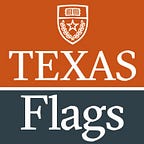Anti-racist Writing Across the Curriculum
Workshops organized by Center for the Skills & Experience Flags
As students and faculty become more aware of inherent biases in language use and structural inequities in writing engagement, the Flags team has worked to support teaching that acknowledges and addresses these biases. In fall 2021, the Center for the Skills & Experience Flags was awarded an Actions that Promote Community Transformation (ACT) grant from the Vice Provost for Diversity in order to offer two workshops pertaining to anti-racist writing pedagogy in 2022. We received an overwhelming response, and added another workshop. Overall, the Flags team offered three workshops, serving 36 faculty across a broad range of 25 departments, from 11 different schools and colleges at UT Austin. The workshops focus on how faculty can address racism in writing-intensive classes, as they become more aware of inherent bias in common approaches to language acquisition that perpetuate systemic inequities both in academia and in the workforce.
These workshops primarily used the concept of language subordination, illustrated in Rosina Lippi-Green’s book, English with an Accent: Language, Ideology, and Discrimination in the United States. The discussion regarding Lippi-Green’s work revolved around society’s and academic’s infatuation with standard American English (SAE), the racism and linguistic prejudice which are encoded into education, and problems with previous efforts to address them. The discussion in the workshop further focused on systematic barriers in academia and research for non-standard English speakers and the ethical responsibility of instructors reviewing their work.
Through these workshops, we were able to further zoom into Lippi-Green’s idea that this infatuation we have we have SAE is harmful and creates unreasonable expectations for non-native English speakers. An exercise helped participants see that many of these “problems” are mostly just “annoyance” felt by the instructor, and that a lack of SAE does not equate to a lack of thought or reasoning skill.
Reader comprehension is key, and failure to acknowledge this is one way we may perpetuate linguistic injustice. Hence, the workshops placed emphasis on the need for the reviewer to reflect on their bias, acknowledge differences, and provide honest feedback through reciprocal reader-writer conversations.
These workshops are essential in destigmatizing non-native English academic writing; demand for anti-racist writing workshops and outpouring of positive feedback after every workshop is a testament to this fact. An endline survey found that 100% of participants agreed that the discussion has been useful for their work at UT, while 93% reported that that they left with ideas or materials immediately useful for their teaching. Many faculty members also reported that after the workshop, they were able to better reflect on their grading methodologies, and were able to view their role as an instructor in a more grounded and systematic way. Kaitlyn Farrell Rodriguez, a Graduate Teaching Consultant and PHD candidate at UT Austin, is one of the many participants who were able to immediately incorporate the learnings from the workshop to her classroom:
“As a result of the Writing Flag Committee’s Anti-Racist Writing workshop and as a current Center for Teaching and Learning Fractalizing Pedagogy Fellow, I am revising my own writing-intensive courses with anti-racism, accessibility, and linguistic justice in mind. I want to restructure my course and our classroom environment to more effectively support multilingual and multi-dialect writers who wish to create bilingual or code-meshed projects that encourage them to fully explore their multiple means of expression.”
Detailed materials from the workshop are available on the Writing Flag Canvas Resource Page. More robust content will be further disseminated and made available as, in light of overwhelming demand and positive feedback, the Flags team plans to continue offering these workshops in the 2022–3 academic year. Through these continuing workshops, we aim to build upon this momentum in order to create a more holistic and welcoming circle of academics and researchers.
If you would like to know more about the Flags program at UT Austin, you can find more information at the Center for the Skills & Experience Flags website.
